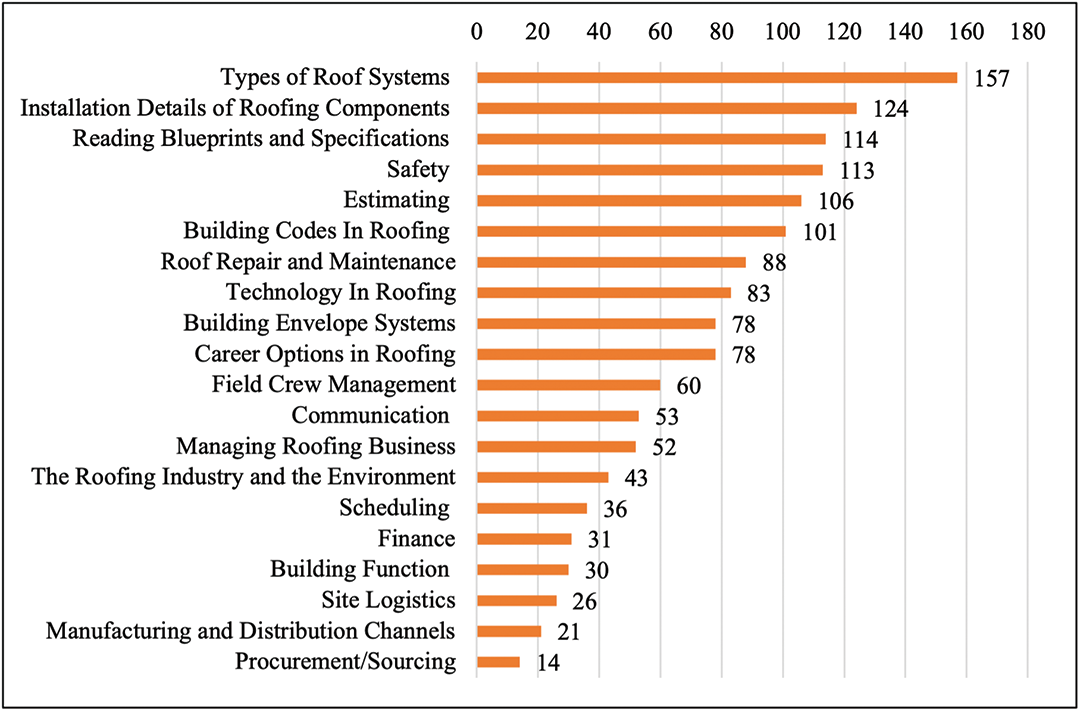
The U.S. construction industry continues to face a declining workforce—studies of age-related demographics show the industry will not be able to meet its future workforce demands under current conditions. As one of the construction industry’s most essential sectors, the roofing industry faces an even greater challenge than other sectors because roofing-related education is only covered (if at all) for a few hours in college and university four-year construction management curricula.
To improve this situation, Clemson University’s Nieri Department of Construction, Development and Planning, Clemson, S.C., and the Roofing Alliance developed the first nine-credit, three-course roofing certificate program for construction management schools to expose roofing as a potential career option for college students.
Initial survey
The first step to creating the courses included surveying roofing industry professionals to learn what they think about roofing curricula in higher education. During this phase, a task force of nine roofing professionals was created to provide industry expertise and feedback. Three of the industry’s key sectors (contractor, manufacturer and distributor) were represented on the task force.
The survey was distributed to 400 Roofing Alliance and NRCA members.Of these 400 roofing professionals, 167 responded, and 92% of respondents either strongly agree or agree a lack of workforce is a major challenge for the roofing industry.
In addition, 84% of participants either strongly agree or agree university graduates lack basic knowledge regarding the roofing industry; 84% strongly agree or agree educating university students about the roofing industry could help tackle workforce issues; and 86% of participants strongly agree or agree university programs should include roofing courses as part of their curricula.
Also, 93.4% of participants responded they would be more likely to provide employment opportunities for students with some type of formal roofing education in an academic setting.
Curriculum
Because roofing is a diverse, specialized field, one of the challenges of developing a curriculum framework was to understand the content and concepts that were necessary to be included. To do that, a second survey was developed and distributed to the same 167 respondents for their input about topics that should be covered with a special emphasis on the specific skill sets required of a college graduate before entering the roofing workforce.
The figure shows the combined ranking of 20 curriculum topics from all roofing industry sectors. Notably, 59.2% of participants agreed to assist in developing the courses by providing lecture content, product donations, site visits, project case studies, and online and in-person guest lectures.
Implementation
Based on the curriculum development, three roofing courses were offered as electives to Clemson University undergraduate and graduate students for three semesters. Eighty students enrolled in the courses, and 39 roofing companies participated as guest lecturers. Moreover, the roofing courses became one of the most popular and among the highest enrolled elective courses at Clemson University.
One of the important components of the implementation phase was understanding the effects these courses had on students’ learning and their perceptions about the roofing industry. Perception surveys were conducted at the beginning and end of the semester. A comparative analysis between preferred aspects and the perception questions of the surveys also was performed.
The first student survey was created to understand the students’ backgrounds and current knowledge about the roofing industry, students’ interest in enrolling in the course and perceptions about the roofing industry before the course. The survey was distributed during the second week of the semester.

Most students had no prior experience working in the roofing industry and had not enrolled in any roofing-specific courses. The students who had some experience in the roofing industry received their knowledge from general contractors. The students who had enrolled in a roofing-specific course before the formal course offerings had been part of the university’s national roofing competition team.
The survey also aimed to understand the students’ motivation for enrolling in the course. Curiosity about the roofing industry, various topics covered in the course and industry members’ participation were the top three reasons students enrolled. The survey showed the roofing industry members’ involvement in curriculum development and course implementation was a critical factor for student enrollment.
The second student survey was created to understand what students liked about the course, how the course affected student learning about the roofing industry, the perception of the roofing industry, overall course satisfaction and interest in additional courses.
Industry professionals’ involvement in delivering guest lectures, the variety of topics covered, and the layout and structure of the class were the top three most liked aspects.
Students also were asked to rate how much they learned about each topic presented during the course. Students said they had gained in-depth learning about all roofing topics from the three courses.
Analysis of the class surveys showed that before the courses, 30% had some knowledge and information regarding the roofing industry and only 14% had adequate knowledge about the salary, benefits and career advancement opportunities within the roofing industry.
However, this improved significantly after the three roofing courses were completed. Upon course completion, 74 students (93%) said they have some knowledge and information regarding the roofing industry. There also was a significant improvement in students’ knowledge about the salary, benefits and career advancement opportunities within the roofing industry (69 students [86%] at the end of the courses compared with 11 students [14%] at the beginning). There also was increased interest in seeking employment in the roofing industry.
Students said they loved interacting with industry professionals; thought the courses were among the best in the construction management program; never knew roofing could be so interesting; are excited to start a career in the roofing industry; and learned a subcontracting aspect of construction that previously had not been covered in other classes.
Opportunities
The framework that was chosen to develop the three courses can be implemented free of charge at other construction management schools with ease. The three-course package includes the syllabus, PowerPoint lectures, notes, online video modules, quizzes, assignments, projects and answer keys.
The courses also are available to current roofing professionals as part of the Roofing Professional Management Certificate program offered by the Roofing Alliance and Clemson University. Each course will be available online and self-paced with a total of eight hours of learning content. There will be a test at the end of each course that will require a minimum passing grade of 75%.
Individual certificates will be awarded by Clemson University and the Roofing Alliance for roofing professionals who complete any or all three courses. The first course, Roofing Fundamentals, launched in February. The second and third courses, Roofing Management and Roofing Business Principles and Leadership, will be released in July.
For more information, contact Roofing Alliance Executive Director Alison L. LaValley at alavalley@nrca.net or me at dgajjar@clemson.edu.Dhaval Gajjar, Ph.D., FMP, SFP, is assistant professor and undergraduate program director for the Nieri Department of Construction, Development and Planning College of Architecture, Arts and Humanities at Clemson University, Clemson, S.C.


